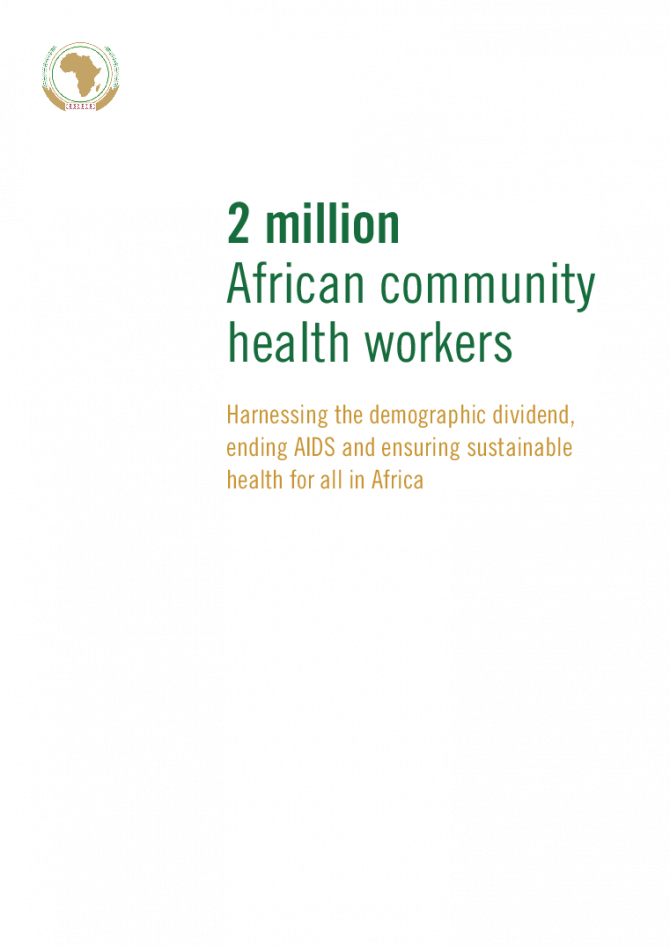
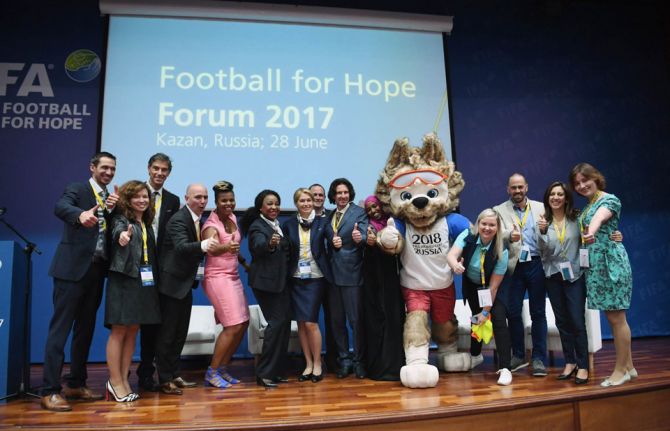
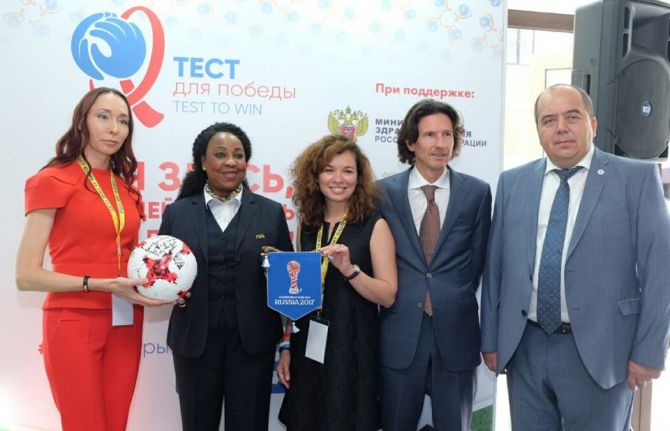
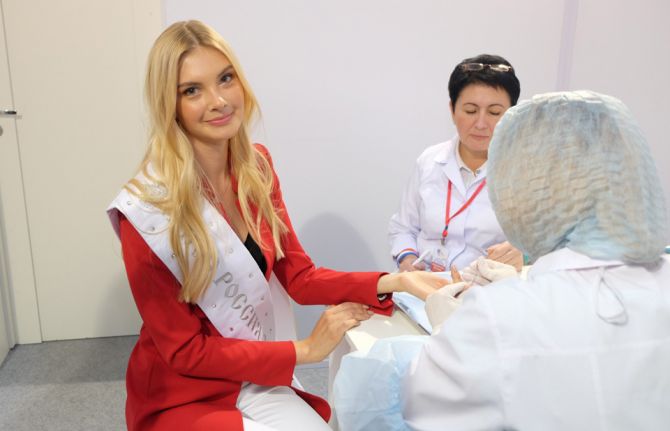
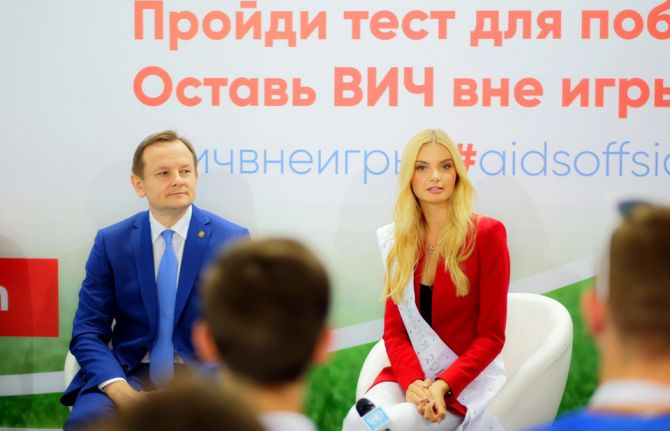
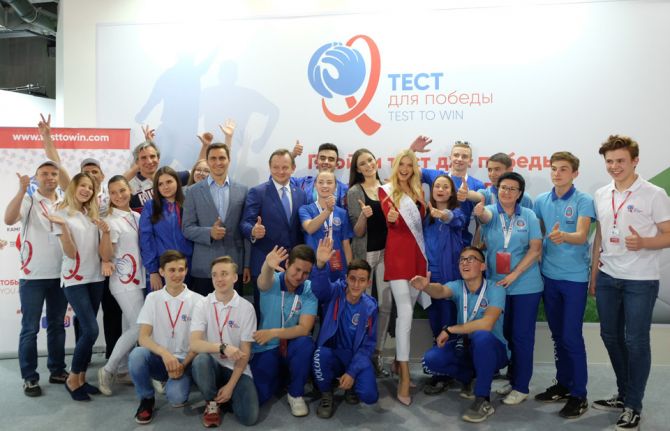
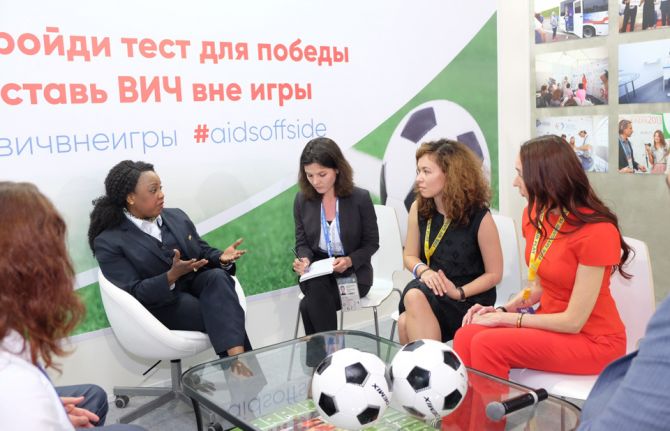
Update
Test to Win at the 2017 FIFA Confederations Cup
06 July 2017
06 July 2017 06 July 2017Free and anonymous HIV testing and counselling were available from the Test to Win pavilion in Kazan, Russian Federation, during the Fédération Internationale de Football Association (FIFA) Confederations Cup, held between 17 June and 2 July.
The pavilion also included an exhibition on HIV and sports and was the scene for workshops, training and appearances by sports celebrities, during which visitors could learn more about HIV. Fatma Samoura, the FIFA General Secretary, visited the pavilion, as did 2018 FIFA World Cup Ambassador Alexey Smertin, Miss Russia 2017, Polina Popova, and the photographer Serge Golovach.
During the two weeks of the competition, more than 3500 people visited the pavilion and received counselling on health issues—more than 1000 of whom were tested for HIV.
The campaign was led by the nongovernmental organization New Century, in partnership with Svetlana Medvedeva’s Foundation for Social and Cultural Initiatives and with support from the Ministry of Health of the Russian Federation, the Republican Center for Prevention and Control of AIDS, the Ministry of Health of Tatarstan and UNAIDS.
On 26 and 28 June, Kazan hosted FIFA’s Forum 'Football for Hope' to promote and develop the use of football as a tool for social development in the Russian Federation and abroad. The forum brought together representatives of nongovernmental organization supported by FIFA’s Football for Hope from all over the globe to share their experiences and successes working in social development in football. The programme included panel discussions with the participation of UNAIDS and others on how football can help to achieve the Sustainable Development Goals.
Quotes
“UNAIDS’ Protect the Goal campaign at previous World Cups used sport to empower young people and adults to access HIV services. I hope that Test to Win will also become a flagship campaign initiative to mobilize people in the Russian Federation and globally.”
“This is not the first project on HIV and sports in Tatarstan and we are happy to continue our collaboration not only in sports with FIFA, but in innovative social development such as HIV prevention and the Test to Win campaign.”
“The most important thing is to involve and convince as many young people as possible. That in no case should you be ashamed to learn more about HIV and get tested. Everyone needs to know their HIV status!”
“FIFA’s Football for Hope demonstrated the global power of football to achieve gender equality, provide access to education, build piece and end AIDS. The Test to Win campaign is another example on how sport can help to reach the 90–90–90 targets.”
Region/country
Related





Feature Story
United States leadership crucial in ending AIDS
19 June 2017
19 June 2017 19 June 2017The Executive Director of UNAIDS, Michel Sidibé, has spoken out about the need for continued leadership in global health from the United States of America to end the AIDS epidemic. During a speech at the Foundation for AIDS Research (amfAR) Capitol Hill Conference, Mr Sidibé said, “What scares me is the move to a conspiracy of complacency. People think that AIDS is done, that we can move on. Now is not the time to lose our momentum.”
Senior United States officials, researchers, implementers, policy-makers and advocates were present at the event, which was held to review the substantial progress in the response and what is required to end the AIDS epidemic by 2030.
The conference, Making AIDS History: a Roadmap for Ending the Epidemic, was chaired by Susan Blumenthal, amfAR’s Senior Policy and Medical Advisor and former United States Assistant Surgeon General. Speakers acknowledged the strong bipartisan commitment and leadership of successive United States Administrations and the Congress, which have saved millions of lives and made it possible to begin envisaging a world without AIDS. It was noted that cuts to international assistance, multilateral organizations and United States global AIDS programmes would have irreversible and devastating consequences.
Deborah Birx, United States Global AIDS Coordinator and Special Representative for Global Health Diplomacy, presented data illustrating dramatic results, including progress towards reaching the 90–90–90 targets among adults in Malawi, Zambia and Zimbabwe and corresponding declines in new HIV infections.
“It is remarkable what we have achieved, bringing together governments and communities, with the support of UNAIDS and collaboration with the Global Fund to Fight AIDS Tuberculosis and Malaria,” said Ms Birx. “These essential partnerships make hard-earned United States taxpayer dollars go so much further and amplify our results.”
Mr Sidibé emphasized that partnership and global solidarity are paying off—in both economic terms and in the number of lives that have been saved. “The generosity and compassion of the American people has helped us move from despair to hope,” he said.
Kenneth Cole, Chief Executive Officer of Kenneth Cole Productions, Chairman of amfAR and International Goodwill Ambassador for UNAIDS, referred to commitments made by governments to Fast-Track the response to the epidemic and said that strong, continued United States leadership is essential to seizing the moment and dramatically scaling-up access to HIV treatment and prevention services. “We are at a tipping point and tipping points can go one of two ways—we have to end up on the right side. We have come too far to see 35 years of hard won progress grind to a halt,” said Mr Cole.
UNAIDS is leading global efforts to end the AIDS epidemic and is working with countries, donors, civil society and partners to increase action and Fast-Track the response to HIV over the next four years to end AIDS as a public health threat by 2030.

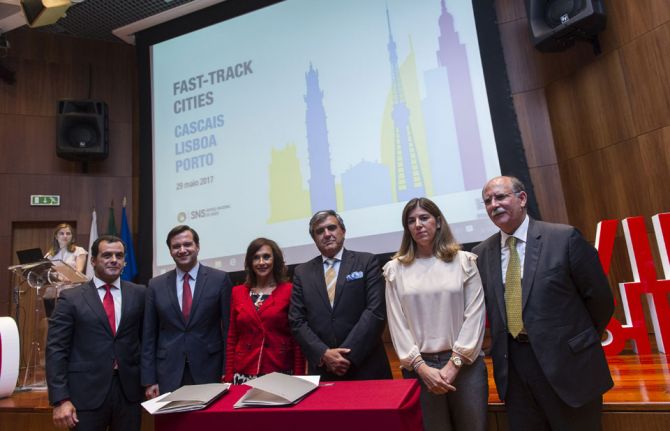
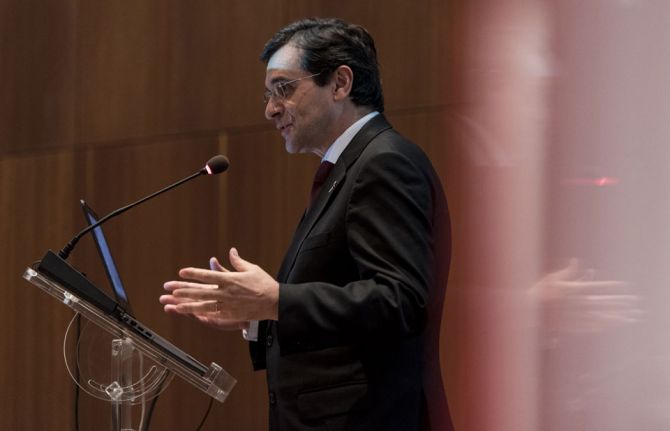
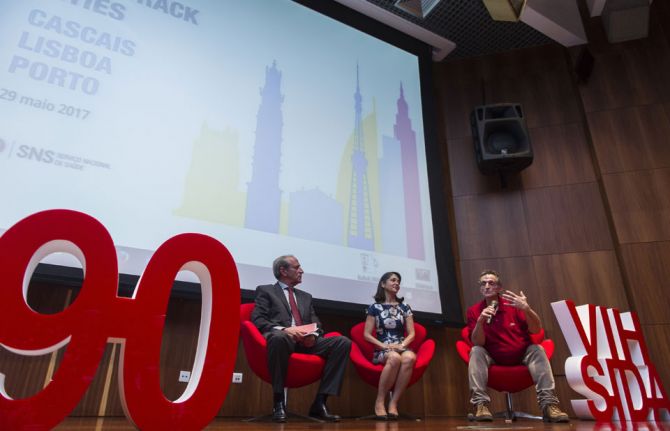
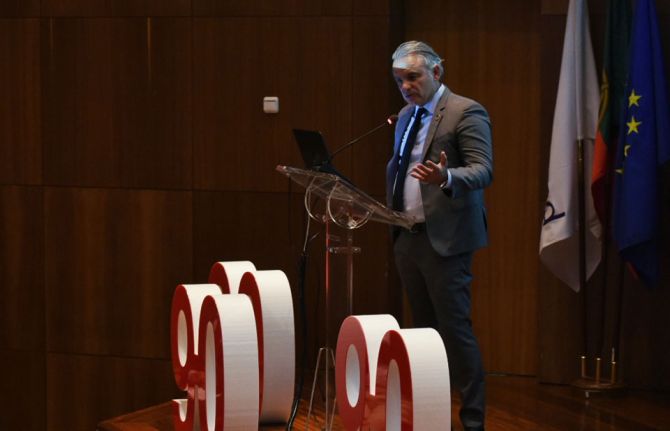
Update
Cascais, Lisbon and Porto sign the Paris Declaration on ending the AIDS epidemic in cities
31 May 2017
31 May 2017 31 May 2017The mayors of the Portuguese cities of Cascais, Lisbon and Porto have signed the Paris Declaration on ending the AIDS epidemic in cities—the first time that three cities in the same country have signed the declaration together.
In signing the Paris Declaration, mayors commit to putting their cities on the Fast-Track to ending the AIDS epidemic. The three mayors committed to achieving the 90–90–90 targets by 2020, whereby 90% of people living with HIV know their HIV status, 90% of people who know their HIV-positive status are accessing treatment and 90% of people on treatment have suppressed viral loads. They also committed to eliminating all forms of discrimination and developing a people-centred approach to the AIDS response, leaving no one behind.
During the signing ceremony, which took place on 29 May in Lisbon, Portugal, the Minister of Health of Portugal, Adalberto Campos Fernandes, reaffirmed the political commitment at the highest level to the response to HIV and highlighted that the 90–90–90 targets have a new impetus in the country.
The three cities will establish local strategies to remove barriers to accessing HIV services, eliminate discrimination and close the gaps to reaching the targets in the Paris Declaration. To that end, the Government of Portugal has put together a group of experts from government bodies, civil society and academia, who will identify and recommend concrete actions in the next 90 to 120 days.
During the event, the Director of the national AIDS programme, Isabel Aldir, presented the results of the national programme for HIV and tuberculosis for 2017. Ms Aldir said that in 2016, there were 841 new HIV infections in the country, the lowest for 15 years. Nonetheless, the plan for 2017 will focus on increasing the number of rapid tests by 15% and developing clinical guidance standards for the effective provision of pre- and post-exposure prophylaxis. The plan will also include preparing an evaluation report on a pilot project for dispensing HIV treatment in community pharmacies and promoting the implementation of the Fast-Track cities commitments.
Quotes
"Today is a historic day because, once again, Portugal proves that when we work together nothing is impossible. After winning the European Football Championship and the Eurovision Song Contest, it is now time to win the fight against AIDS. By working together, the government, city mayors, national health institutions, the social and private sector and civil society, we will build a better country, free of HIV and free of discrimination. Together we will always be stronger!"
"By joining the UNAIDS Fast-Track Cities global movement, Cascais has made a firm commitment to work towards the Sustainable Development Goals and to ending AIDS as a public health threat by 2030. The Cascais City Hall is proud to be working with SER+ Patient Association and other local and national partners in this project, promoting better health and more social justice for all our citizens."
“Portugal is an example of a successful response to AIDS that has put people’s needs first. Its success is based on a strong political leadership as demonstrated again here today, an inclusive legislation that protects people from discrimination and a very active civil society.”
“Political leadership is needed to facilitate access to health services, including for HIV, to migrant populations, whose HIV prevalence is increasing, especially in big cities. Portugal has become again a leading example on public health and human rights-based policies by removing all barriers on access to prevention, diagnosis and treatment of HIV, tuberculosis, viral hepatitis and sexually transmitted infections for undocumented migrants in 2017.”
“The International Association of Providers of AIDS Care welcomes the cities of Cascais, Lisbon and Porto as the most recent European cities to join the Fast-Track cities network. Working in collaboration with local stakeholders, including government officials, community representatives and clinical and service providers, we are convinced that these three cities can attain the 90–90–90 targets by 2020, thus assisting the country of Portugal to do so as well.”
Region/country
Related
 Government ensures continuity of treatment in Malawi
Government ensures continuity of treatment in Malawi

10 February 2025


Feature Story
Democratic Republic of the Congo on track with its HIV catch-up plan
22 May 2017
22 May 2017 22 May 2017The Democratic Republic of the Congo’s HIV catch-up plan shows that impressive results in the response to HIV can be made when partners work together.
Launched in December 2016, the western and central Africa catch-up plan aims to ensure that 4.5 million people living with HIV in the region will have access to HIV treatment by 2020. In support of the regional plan, the Democratic Republic of the Congo’s country plan—developed and implemented by the Ministry of Health and the National AIDS Commission—aims to increase the number of people on antiretroviral therapy in the country by 80 000 people, to more than 200 000 people by June 2018.
An intensive HIV testing campaign in the country has enabled 2 million people to know their status—essential to enabling people to access HIV treatment.
Coverage of antiretroviral therapy in the country stood at just 33% of people living with HIV in 2015, higher than the region’s coverage (28%), but much lower than the coverage in eastern and southern Africa (54%). According to government estimates, by April 2017, 34 000 more people were on treatment. The increase puts the country on track to reach the June 2018 target, which would see 73% of people living with HIV on treatment.
The encouraging increase in treatment coverage resulted from a range of partners—the Ministry of Health and the National AIDS Commission, United Nations agencies, the Global Fund to Fight AIDS, Tuberculosis and Malaria and the United States President’s Emergency Plan for AIDS Relief, among others—working together to finance and give technical support to the scale-up. By focusing on the three most affected provinces in the country, resources have been maximized where they are most needed.
Community-based antiretroviral medicine distribution points and community-based early warning systems have helped to reduce drug stock-out and improve the quality of HIV services. These community health services are among the best practices that have been scaled up to increase treatment coverage.
UNAIDS is working with countries to ensure that 30 million people living with HIV have access to treatment through meeting the 90–90–90 targets—whereby 90% of people living with HIV know their HIV status, 90% of people who know their HIV-positive status are accessing treatment and 90% of people on treatment have suppressed viral loads—by 2020.
Quotes
“The Democratic Republic of the Congo’s example shows what can be done. UNAIDS encourages other countries to mirror the catch-up plan and accelerate efforts towards ending AIDS in the western and central Africa region, ensuring that no one is left behind.”
Region/country
Related

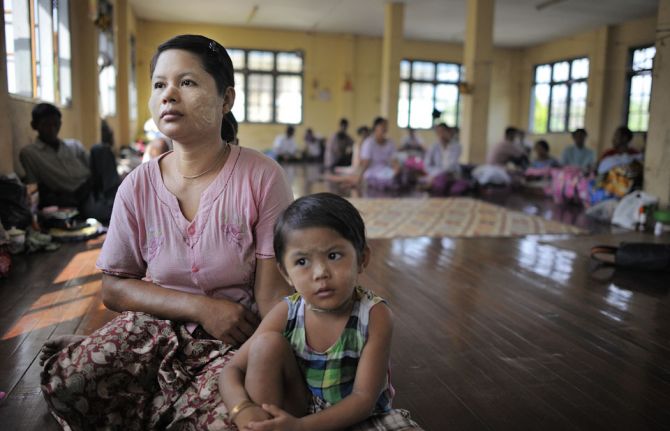
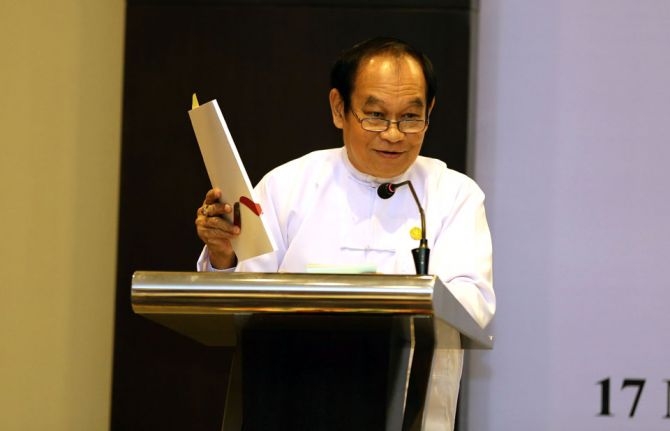
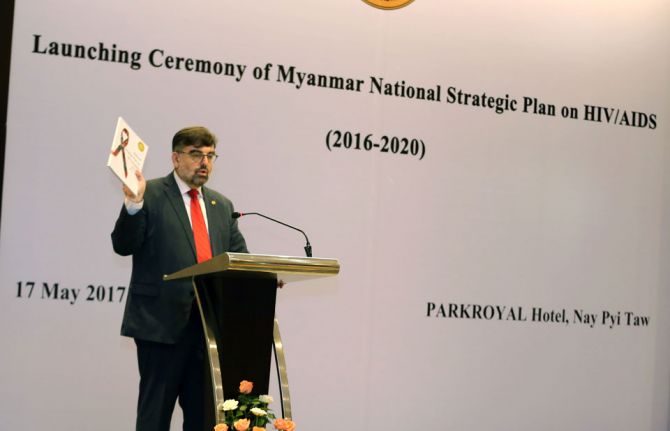
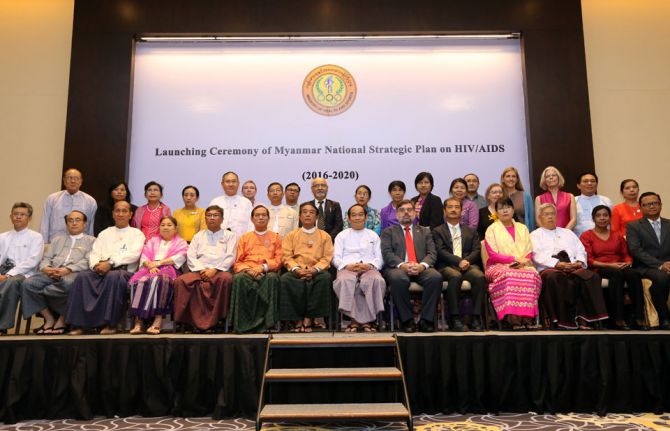

Update
Myanmar launches new HIV strategic plan
19 May 2017
19 May 2017 19 May 2017The Ministry of Health and Sports of Myanmar launched the country’s latest five-year HIV plan on 17 May. The plan provides a road map on how to Fast-Track the national HIV response and end the AIDS epidemic as a public health threat by 2030.
Myanmar is one of the 35 countries accounting for 90% of new HIV infections globally. The new plan adapts global Fast-Track Targets to the local context to ensure an effective, cost-effective and high-impact HIV response. Locations are prioritized based on their HIV epidemic and risk of new HIV infections and service delivery approaches are tailored to reach priority populations and speed up access to services.
The ambitious plan aims to ensure the 90–90–90 targets—whereby 90% of people living with HIV know their HIV status, 90% of people who know their HIV-positive status are accessing treatment and 90% of people on treatment have suppressed viral loads—are met by 2020. The plan also aims to ensure that 90% of key populations access HIV prevention services and that 90% of people living with and affected by HIV report zero discrimination, especially in health, education and workplace settings.
During the launch, the Union Minister of the Ministry of Health and Sports, Myint Htwe, stressed the importance of translating the plan’s strategies into action.
Quotes
“All of us sitting in this room, together with Ministry of Health officials, should do our level best, within the capacity and capability that we have. I will also render all out support in running this programme successfully during my tenure as the Minister of Health.”
“Over the past years, we have seen tremendous progress in Myanmar’s national HIV response owing to the combination of focused efforts in prevention and treatment services. This new strategic plan will help propel the country faster towards its Fast-Track Targets.”
Region/country

Update
Marc Angel calls to accelerate momentum towards achieving the 90-90-90 treatment targets
03 May 2017
03 May 2017 03 May 2017Ahead of the mid-term review of the 90–90–90 treatment targets in 2017, Marc Angel, Chair of Foreign Affairs and Development Committee of the Luxembourg Parliament and UNAIDS Champion for the 90-90-90 targets, undertook a multicountry fact-finding visit to Botswana, South Africa and Lesotho from 17 to 21 April. The visit provided Mr Angel with the opportunity to conduct high-level political advocacy to continue and accelerate momentum towards achieving 90–90–90 by 2020.
The fact-finding visits to southern Africa confirmed the importance of intensifying efforts to increase the proportion of people living with HIV who know their HIV status. In addition, the visits highlighted the central importance of community health workers, both to achieve the 90–90–90 targets and to ensure national preparedness to identify and address emerging health challenges.
What are the 90–90–90 targets?
- By 2020, 90% of all people living with HIV will know their HIV status.
- By 2020, 90% of people who know their HIV-positive status are accessing treatment.
- By 2020, 90% of all people on treatment have suppressed viral loads .
Modelling suggests that achieving these targets by 2020 will enable the world to end the AIDS epidemic as a public health threat by 2030, which in turn will generate profound health and economic benefits
Find out more here
In each country he visited, Mr Angel met with leaders from government and civil society to witness how 90–90–90 is being adopted in high-burden countries. He also visited numerous health facilities and community-based projects to experience first-hand how 90–90–90 is being implemented on the ground. All three countries have adopted and implemented the World Health Organization guidelines for universal HIV testing and treatment for all people living with HIV and have strong political commitment to reaching 90–90–90. The three ministers of health from each country agreed that community health workers must be the central mode of delivery for 90–90–90.
Quotes
“What I have seen in the field is that 90–90–90 is a reality, not only for government officials, but also for communities. Let’s use the next three years to keep the momentum going and indeed to push even harder to achieve our goal.”
“Witnessing how communities are on the Fast-Track to achieve 90–90–90 showed us how important community health workers are for the AIDS response, both in Africa and globally. It is clear that they play an essential role in achieving 90–90–90.”
“Leadership for the AIDS response is crucial. This includes community and traditional leaders, which the CATCH community-based HIV prevention project in Botswana demonstrates perfectly.”
“Currently the world is geared towards a curative health system. 90–90–90 will help us achieve a much-needed change to preventative health services, which will be a smart investment for high-burden countries, such as South Africa.”
“We made the decision to implement same day test and treat in certain locations based on the evidence of people being left behind. We will only succeed if we all pull together to ensure accountability, transparency and leadership for the AIDS response.”
Resources
Region/country


Feature Story
India to provide HIV treatment to all who need it
01 May 2017
01 May 2017 01 May 2017Veena has been living with HIV for more than 15 years. The community educator, who lives in Bangalore, India, has been on HIV treatment for more than a decade and says antiretroviral medicine has given her back her health and happiness.
“This medicine is very good. I am very happy,” said Veena. “My life has changed. I am learning three languages and working.”
There are 2.1 million people living with HIV in India, which has the third largest HIV epidemic in the world. On 28 April, during an event in New Delhi, Jagat Prakash Nadda, the Minister of Health and Family Welfare, announced a new test-and-treat policy that commits to providing access to HIV treatment for everyone living with HIV in the country. Prior to the change in policy, people living with HIV could only access antiretroviral medicine for free if their CD4 cells had decreased to less than 500 cells/mm3.
Mr Nadda also said that the ministry’s 90–90–90 strategy will identify 90% of people living with HIV, place 90% of people identified as living with HIV on treatment and ensure that 90% of people on treatment have sustained viral load suppression. “This strategy will offer us an opportunity to work towards our commitment made during the United Nations High-Level Meeting on Ending AIDS.”
People living with HIV in India often access treatment late. This was the case for Veena when she began taking medicine.
“I had lost a lot of weight and I had a high fever. I was tired and I couldn’t work,” said Veena. Initially she did not respond well to treatment, but slowly her weight started to increase and her immune system became better.
UNAIDS has called on all countries to provide HIV treatment to anyone who tests positive for HIV, because treatment keeps a person living with HIV healthy and has the double benefit of stopping the transmission of the virus to other people.
“The Government of India is showing bold leadership and commitment to people living with HIV,” said Steve Kraus, Director of the UNAIDS Regional Support Team for Asia and the Pacific. “This new policy will bring life-saving treatment within reach of more than one million people living with HIV. It will keep individuals, families and communities healthy and productive and ensure that India ends its AIDS epidemic by 2030.”
To rapidly scale-up treatment, India will rely on its network of facilities spread across the country providing HIV services. Rolling out the new policy will also entail strengthening the procurement and supply chain management system as well as sustained community participation.
According to the country’s national AIDS programme, annual AIDS-related deaths declined by 54% between 2007 and 2015, while new HIV infections dropped by 32%. As more people living with HIV follow Veena onto treatment, the double benefits of antiretroviral medicines are expected to lead to a further decline in deaths and new HIV infections.
Veena has managed what she never thought possible: watch her daughter grow into a young adult.
“My life has a future. I don’t have a proper education, but my daughter has completed her degree. She is working. She is an empowered woman,” said Veena.
UNAIDS is working with countries to ensure that 30 million people living with HIV have access to HIV treatment by 2020.
Multimedia
Region/country


Update
Kenya launches self-test kits and PrEP
05 May 2017
05 May 2017 05 May 2017There are around 1.5 million people living with HIV in Kenya, around 400 000 of whom are unaware that they have the virus. If people do not know their status, it is impossible for them to access life-saving treatment.
There are also high numbers of new HIV infections, particularly among young people and among key populations. In 2015, there were an estimated 78 000 new HIV infections in Kenya. And testing rates are low, especially among men, meaning they are not able to benefit from treatment.
In response, the Government of Kenya has launched two innovative technologies that it hopes will bring ending the AIDS epidemic one step closer: self-testing for HIV and pre-exposure prophylaxis (PrEP) to prevent HIV infection.
The Kenyan Ministry of Health has launched the Be Self Sure campaign to encourage people to get tested for HIV. As part of the campaign, the government is making HIV self-test kits available through public and private health facilities and selected pharmacies for around US$ 8 each, a low price which was negotiated in a partnership between government of Kenya and the private sector. From July 2017 the government hopes to make the test kits available for free in public health facilities.
PrEP is pre-exposure prophylaxis—the use of antiretroviral medicines to prevent HIV among people who are HIV-negative.
The campaign website includes an interactive map to let people know where to get the testing kits from and plays videos demonstrating how to use the kits and tells people what to do if they are HIV-positive or if they are HIV-negative. A helpline, open for 12 hours a day, is also available.
For people testing negative for HIV, the site urges people to talk to their health providers about HIV prevention options, including PrEP, a medicine that people at higher risk of HIV infection can take to prevent becoming infected with the virus. PrEP is being rolled out as part of the campaign, with the Government of Kenya offering it free of charge in selected public health facilities as part of a combination HIV prevention programme for people most at risk of HIV infection, including young people, serodiscordant couples, people who inject drugs and sex workers. The medicine will also be available for around US$ 36 dollars a month at private hospitals and pharmacies for anyone wishing to use it.
Around 10 countries and the European Medicines Agency have now approved the use of antiretroviral medicines for HIV prevention, with more set to follow. The implementation of PrEP strategies follows the guidelines established by the World Health Organization in 2015, which recommend the use of PrEP by members of key populations. The number of people using PrEP to prevent HIV is now thought to have risen to around 120 000 people, the majority in the United States of America. The roll out of PrEP in Kenya is a major advance in efforts to stop new HIV infections in the countries most affected by HIV.
By launching this new initiative, Kenya is continuing to affirm its position as a leader and innovator in efforts to end the AIDS epidemic by 2030.
UNAIDS is working closely with Kenya to prevent new HIV infections and to ensure that, by 2020, 90% of people living with HIV know their HIV status, 90% of people who know their HIV-positive status are accessing treatment and 90% of people on treatment have suppressed viral loads. By achieving these targets, Kenya will be able to end its AIDS epidemic by 2030.
Quotes
“With the launch, Kenya becomes the first country to undertake a national roll-out of HIV self-testing and the second in Africa to bring to scale pre-exposure prophylaxis for prevention of HIV infection for those at high risk. Kenya is committed to revitalizing HIV prevention while ensuring access to treatment.”
“We must increase our investments and deliver on HIV prevention so that Kenya will achieve the goal of eliminating new infections by 2030.”
“Kenya’s commitment to embracing technology and bringing to scale innovative interventions is a result of exemplary leadership in the HIV response.”
Campaign
Region/country
Related




Update
Health Council of the CIS reaffirms commitment to Fast-Track the end of AIDS
02 May 2017
02 May 2017 02 May 2017Representatives of the ministries of health of the Commonwealth of Independent States (CIS) have reconfirmed their commitment to end AIDS by 2030. The ministers made the commitment at a meeting at the Health Council of the CIS, held in Bishkek, Kyrgyzstan, on 28 April.
Since 1997, the CIS has consistently highlighted the importance of the AIDS response. However, since 2010 the HIV epidemic in the CIS countries has continued to get worse. At the end of 2015, UNAIDS estimates that 1.5 million people were living with HIV in eastern Europe and central Asia, of which more than 90% are in the CIS countries.
The Director of the UNAIDS Regional Support Team for Eastern Europe and Central Asia, Vinay Saldanha, was invited to the meeting to present how the CIS countries can reach the ambitious targets of the Political Declaration on Ending AIDS by taking a Fast-Track approach. He made a special call for reaching the 90–90–90 targets—whereby 90% of people living with HIV know their HIV status, 90% of people who know their HIV-positive status are accessing treatment and 90% of people on treatment have suppressed viral loads—zero discrimination and a 75% reduction in new HIV infections by 2020 by rapidly scaling up the quality and coverage of HIV prevention services.
Mr Saldanha also highlighted the recent developments in the Russian Federation, where the Duma is considering a draft law that proposes removing restrictions on the travel and residence of foreigners living with HIV and other infectious diseases.
During the meeting, the ministers also discussed ways for better information exchange between CIS countries on epidemiological emergencies and outlined a plan for the implementation of the CIS health strategy.
It was also decided to further strengthen efforts to promote joint health-care programmes among the CIS countries, in close cooperation with the World Health Organization and UNAIDS.
Quotes
“HIV prevention is important for CIS countries. More needs to be done to leverage national responses.”
“Reaching the 90–90–90 targets in Commonwealth of Independent States countries is possible, but requires a rapid scale-up of services, including prevention, treatment, care and support services.”
Region/country
- Eastern Europe and Central Asia
- Albania
- Armenia
- Azerbaijan
- Belarus
- Bosnia and Herzegovina
- Bulgaria
- Croatia
- Cyprus
- Czechia
- Estonia
- Georgia
- Hungary
- Kazakhstan
- Kyrgyzstan
- Latvia
- Lithuania
- Montenegro
- Poland
- Republic of Moldova
- Romania
- Russian Federation
- Serbia
- Slovakia
- Slovenia
- Tajikistan
- North Macedonia
- Türkiye
- Turkmenistan
- Ukraine
- Uzbekistan




